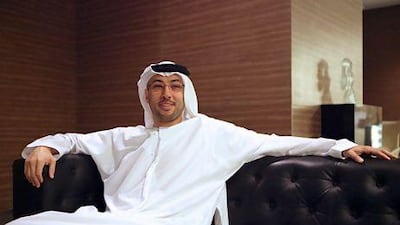Waha Capital has taken control of Anglo Arabian Healthcare, a newly established company, the latest in a string of deals targeting the UAE's medical sector.
The Abu Dhabi-based investment company has taken a 97 per cent stake in Anglo-Arabian, which operates clinics, laboratories and hospitals across the Northern Emirates.
The deal allows Waha Capital, which has interests in financial services, aviation, oil and gas and property development, to add health care to its roster of investments.
"It's a first step in a new sector that has a great potential for growth," said Salem Al Noaimi, Waha Capital's chief executive. "The Government wants to see greater contribution from the private sector in this particular industry in order to increase the quality of services."
Financial terms of the deal were not disclosed, but Waha Capital expects to invest Dh200 million to Dh250m in the health sector during the next three to five years, Mr Al Noaimi said. The deal was funded from Waha's internal capital reserves.
Anglo-Arabian was founded early last year as a means of consolidating the collective bargaining power of numerous healthcare clinics while also reducing costs through shared services and common branding.
It owns two hospitals, six clinics, three diagnostics centres and the Ibn Sina group of pharmacies.
"We spent much of the 2012 period looking for a partner who would share our vision and ambitions for the future," said Mark Adams, the company's chief executive.
Employer-provided health insurance is mandatory by law in Abu Dhabi, with Dubai expected to follow this year. With about half of the UAE's population currently covered by health insurance, it was important for the nation to develop institutions capable of suddenly taking on a large quantity of business, Mr Al Noaimi added.
Expenditure in the healthcare sector is expected to rise from 2.8 per cent of the UAE's economy in 2010 to 3.4 per cent by next year, according to a study from Deloitte in 2011.
A large number of investors have sought to profit from the high incidence of so-called lifestyle-related illnesses, such as diabetes, in the Arabian Gulf.
Waha Capital was careful not to pay an excessive valuation for its first investment in the healthcare sector, which has become increasingly crowded, said Michael Raynes, the company's chief operating officer.
Al Noor Hospitals Group, the UAE's biggest healthcare provider, published a pathfinder prospectus for its initial public offering on the London Stock Exchange this month, in which it sought a valuation of US$950m to $1.26 billion.
Investors have also targeted NMC Health, which raised £117m (Dh674.8m) when it sought a London listing in April last year, with shares increasing 67.7 per cent so far this year.
Waha Capital hopes to make its first investment into the UAE educational sector amid rising quality expectations and undersupply of school places.
The company, which counts the government-owned strategic investment company Mubadala Development among its largest shareholders, has benefited from a rise in the price of its shares of 58.1 per cent so far this year.
The company's stock fell 4.4 per cent yesterday before the announcement of the purchase.

